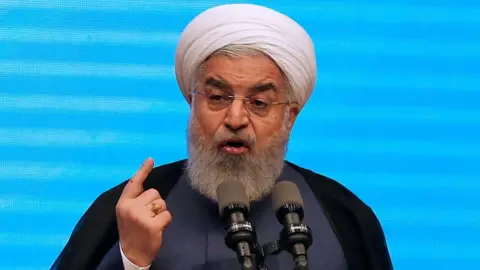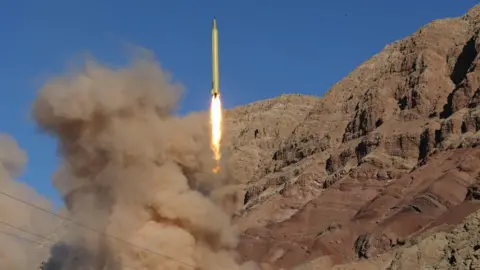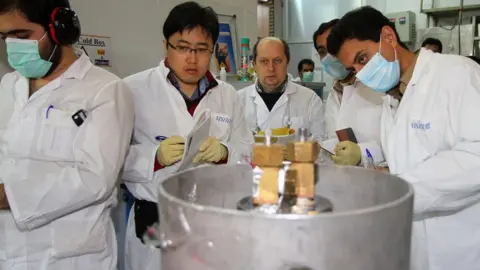Iran nuclear deal: Rouhani says West has no right to make changes
 AFP
AFPIranian President Hassan Rouhani has questioned the legitimacy of efforts by the US and its European allies to change a nuclear deal with his country.
The US and French leaders announced on Tuesday that they were working on a "new deal" that would expand and extend the terms of the 2015 accord.
But Mr Rouhani said they had no "right" to renegotiate a seven-party agreement.
He also dismissed US President Donald Trump as a "tradesman" not qualified to comment on global treaties.
"You don't have any background in politics," he said. "You don't have any background in law. You don't have any background on international treaties."
Mr Trump has said the US will reimpose sanctions on Iran suspended under the deal on 12 May unless Congress and European powers fix its "disastrous flaws".
The five other parties to the accord - France, the UK, Germany, China and Russia - see it as the best way to prevent Iran from developing a nuclear weapon and want Mr Trump to continue waiving the sanctions while they try to address his concerns.
Before holding talks with French President Emmanuel Macron at the White House on Tuesday, Mr Trump called the deal "insane" and left it unclear what would happen next month.
He also warned Iranian leaders that they would "have bigger problems than they have ever had before" if they restarted their nuclear programme.
Afterwards, Mr Macron told a joint news conference that the deal was "not sufficient" but gave Western powers some control over Iranian nuclear activities.
"We therefore wish, from now on, to work on a new deal with Iran," he said.
Based on their discussions, Mr Macron added, it would "need to cover four topics":
- Blocking any nuclear activity until 2025 - a period covered by the current accord
- Making sure there is no Iranian nuclear activity "in the long run"
- Halting Iran's development and testing of ballistic missiles, which Western powers say have been taking place in violation the current deal
- Generating "a political solution to contain" Iran in the wider Middle East, where it is directly or indirectly involved in several conflicts
Mr Trump said: "I think we will have a great shot at doing a much bigger maybe deal, maybe not deal. We're going to find out, but we'll know fairly soon."
 AFP
AFPIt was not clear whether Iran would have any say on the agreement being worked on by US and European officials, but its president poured scorn on Mr Macron's proposals in a televised speech in the city of Tabriz on Wednesday.
"Together with a leader of a European country [the Americans] say: 'We want to decide on an agreement reached by seven parties,'" Mr Rouhani said. "For what? With what right?"
Mr Rouhani also dismissed Mr Trump's "empty" threats to punish Iran if it restarted its nuclear programme in response to sanctions being reimposed.
"We will be taking very important steps regarding our nuclear technology," he added. "Our activities will be very different than the past, but will be peaceful."
 AFP
AFP"We are not thinking about developing nuclear weapons, nor will we think about it."
The European Union's foreign policy chief, Federica Mogherini, meanwhile said the current nuclear deal was working.
"On what can happen in the future we'll see in the future, but there is one deal existing. It's working, it needs to be preserved," she told reporters in Brussels.
Russian presidential spokesman Dmitry Peskov said Moscow was also in favour of keeping the deal in its current form because it believed "no alternative exists".
